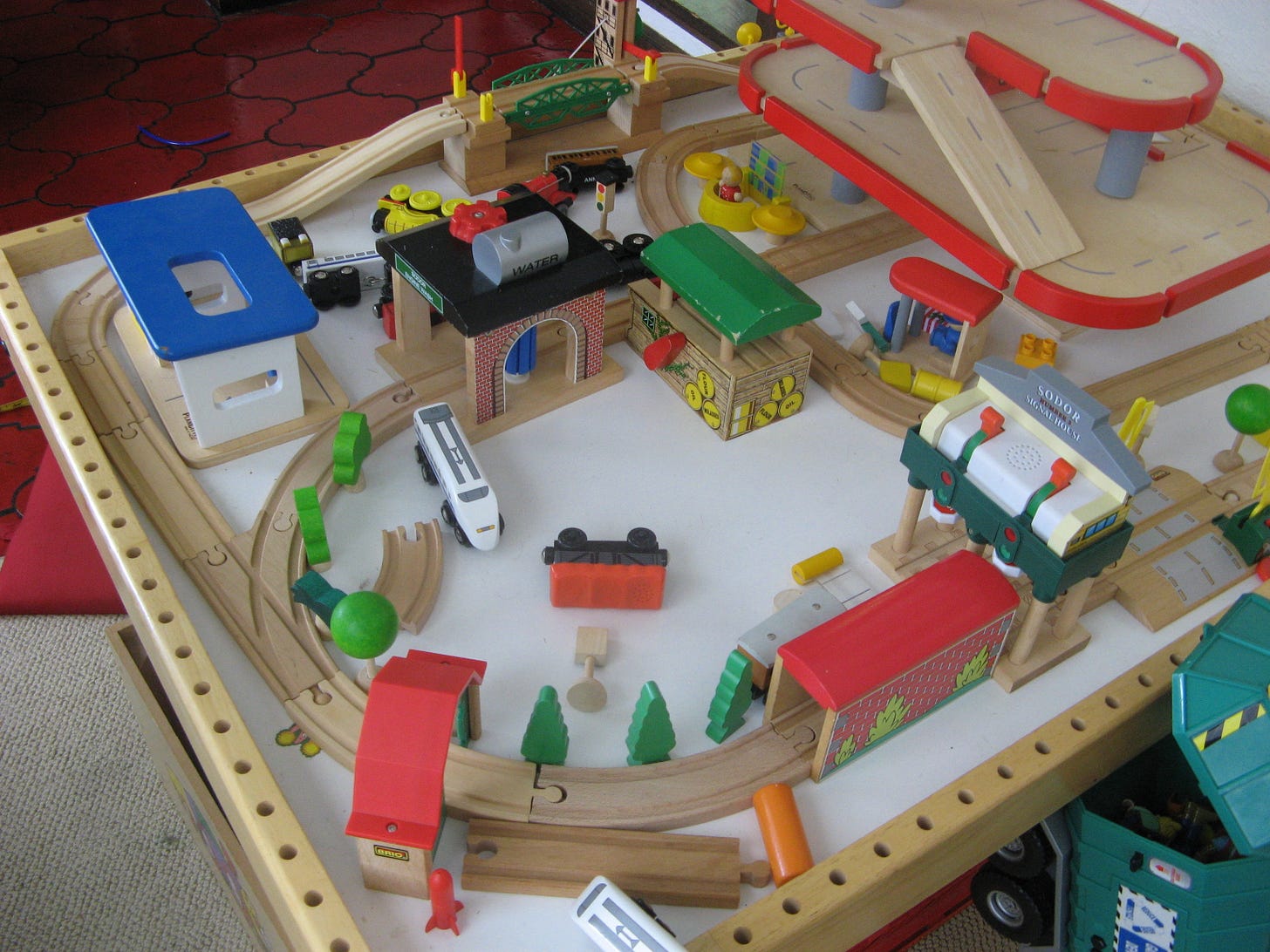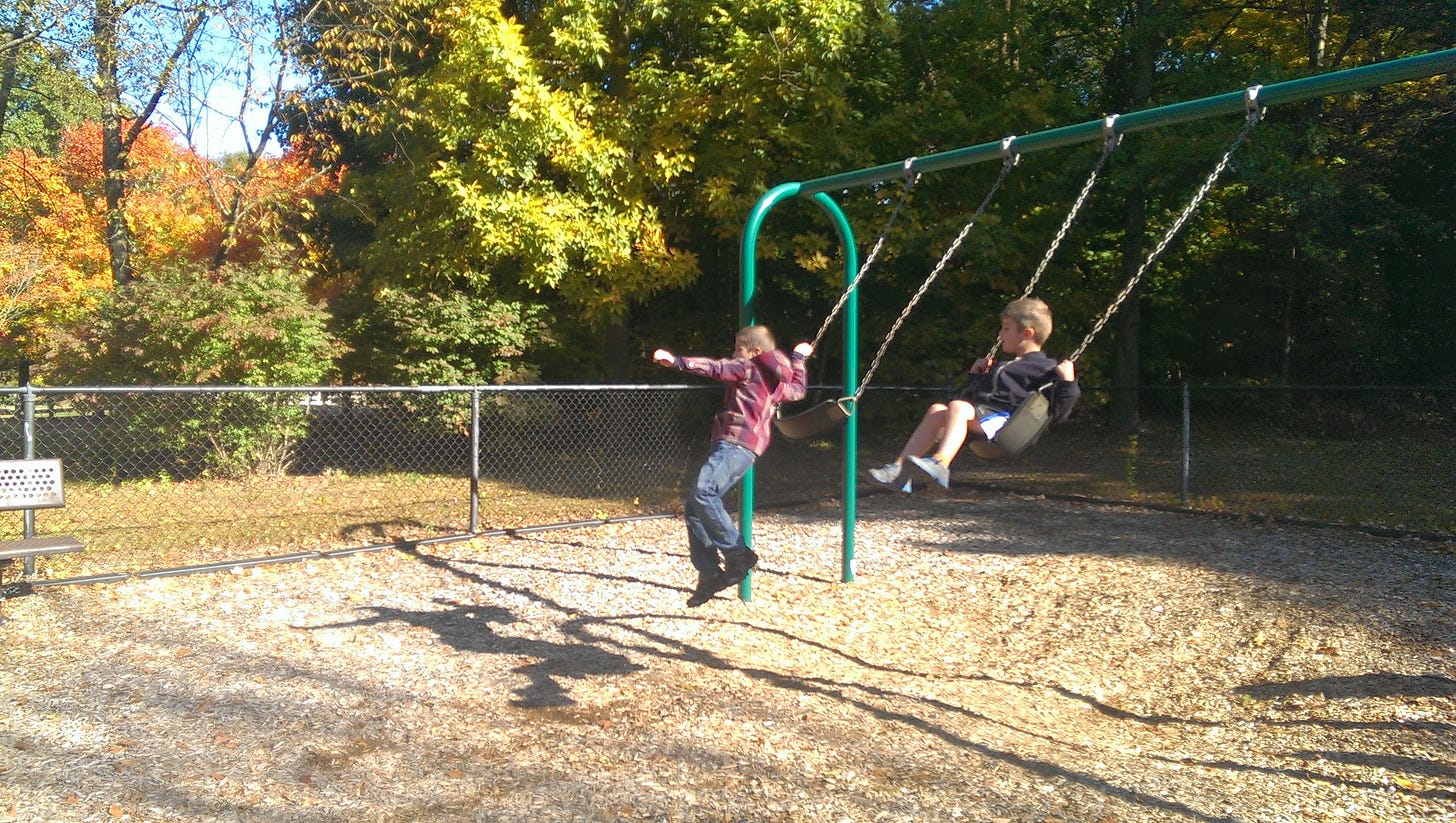When the kids were little, smoothing over bumps in their day was easier. An argument over a toy could be assuaged with introducing another toy, implementing a timer to ensure each sibling got time with the desired toy, or removing the toy from either child. A sudden meltdown might be quickly resolved with some grapes or apple slices. The origins of distress fell in a fairly narrow range of possibilities—I want your attention, I am bored, I want to explore that, I am hungry, I am tired, I don’t want to share, I am bothered by my brother, I want to figure out what happens when I say or do this. And thus, the responses and resolutions could be more easily accessed and executed. Getting from red-faced discontent to belly laughs was surprisingly quick, if you could just hit on the right antidote. Frustration about the 14 or so wooden trains Z had strung together not being able to race around his windy track could be addressed by removing some train cars, straightening out a curved track. Sometimes, it took a break in the kitchen with a handful of Annie’s Bunny Grahams or a small cup of baby carrots to convince the station master that starting with five or so trains might work better. But eventually, the storm of frustration and foot stomping would pass. A heated battle over who got to play with the cement mixer or recycling truck could be diverted with a reminder about the crane off in a forgotten corner of the playroom. And when all else failed, a trip to the park with its promise of swings and slides and exploration of play structures could almost always elicit joyous exclamations.
In those interactions, I was hopefully teaching and modeling for these small people that problems are solvable, big emotions can be tolerated and will pass, sometimes the answer is compromise and sometimes the answer is to stop and move on. Sometimes the answer is food and a sippy cup. Sometimes the answer is a walk to the park. Sometimes, we each need a little bit of space, alone time. But there is always an answer, always a way to continue forward.
As they grew, the bumps got bigger, trickier, harder to avoid, more challenging to navigate. The range of things that could be distressing grew wider and more varied, the possible emotional responses expanded and deepened. They felt left out, made fun of, ashamed, unsure, confused, upset, angry, disappointed. The excitement over sharing all Z knew about Egypt got shut down by another child who wasn’t as interested, didn’t share Z’s enthusiasm for sarcophagi and amulets, Nefertiti and Tutankhamun. And this hurt. A coach prioritized his winning record over nurturing L’s passion for the sport, leaving him dejected and shamed. An unnecessary and biting criticism from a family member left M shut down and withdrawn. I worked hard to find the balance between advocating for my children, insisting that adults behave like, well, adults, and trusting my children to find their own way. It’s a hard balance, as most any parent knows. I have never known a depth of fierce protectiveness like that I have when my child is hurting. I had not known how unrelenting I would be in demanding adults ensure an environment in which my child was safe until I realized the adults in charge were not ensuring he was.
While the scenarios were more complex, the resulting feelings more complicated than when their voices were sweet and high-pitched, the principals were still largely the same: Most problems can be solved. Sometimes the solution is working through things. Sometimes it’s walking away. Sometimes, it’s giving things space and time. Sometimes, it’s advocating and persisting until you are heard. The feelings can be big and overwhelming. And they hold on a lot longer than when the sadness was over not being allowed to have a popsicle for dinner. A broken heart can feel unmendable. A betrayal can leave you shocked and hurt. Not being understood can feel painful and confusing. But these feelings eventually soften, the wounds do heal.
Underlying all of this are several beliefs. People are generally good at heart (to paraphrase Anne Frank). Belief in this goodness leads us to value benevolence—the desire to be kind toward those we know and more generally, a universal recognition of the value of each human life. We also rely on a sense of openness to change—the belief that if we share with others how their words or actions are affecting us, they will consider changing those behaviors. While we do encounter people in our lives who place other things above these values—selfishness, power, money—in general, these are shared beliefs and values that we rely on for communities and societies to function.
Over the past eight years, I have thought far too many times about if these values were being eroded. If I had raised my children with a set of expectations that were no longer reliably universal. I have never wondered this more than in the past month. I have pondered, sometimes in a panicked worry, what I can do to stop the march of tyranny, the arbitrary and cruel destruction of not only systems of government, but people’s livelihoods, careers, communities. I have swung between reading too many articles saying that we are the ones we have been waiting for and no one is coming to save us, laying the responsibility to stop the steamroll on citizens and deciding that my daily diet of media consumption is going to send me right back into a frenzied anxious mess. And no one will benefit from the return of that. It feels eerily like the early days of COVID—knowing that something devastating is out there, that it could and likely will affect you and people you love, and not knowing how to best to prevent that inevitability.
Z is home for about 24 hours. He has a long weekend, but had plans on campus until mid afternoon on Sunday. When I arrived to pick him up, he told me that he wasn’t feeling great. He had powered through his lunch-time get together, thought he was mostly just tired. But as we traveled the 30 or so minutes home, he started to decline. He was shivering, asking me to turn up the heat. He put the seat back and tried to sleep.

I brought him home, made sure he was situated upstairs in his room, and headed out to the grocery store to finish the shopping and pick up things for a sick boy. He called me at the grocery store, asking if I could bring him a glass of iced water. D was home and able to bring him water, while I rushed through the shopping, stocking up on oyster crackers, broth, and Lipton’s chicken noodle soup. Once I was home, I headed upstairs and checked in on Z. His forehead was hot when I touched it, though he was asking for another blanket, because he was cold again. I brought him an electrolyte drink and some ibuprofen, tucked the second comforter around him, and gently rubbed his head, like I had when he was small. Though I knew his sickness meant he had to cancel happily anticipated plans with his friends, also home for the long weekend, I was glad he had come home anyway. I was grateful he was here, grateful I could bring him an extra blanket, two ibuprofen pills, and gently touch his feverish forehead, that I could take care of my boy.
And in my trips up and down the stairs to get the things Z needed to be as comfortable as possible, I thought, this is just what I need to do right now: To care for my boy, help him rest and recover. Make him as comfortable as I can so he can use his energy to fight whatever virus has his body under siege. This is exactly what we must continue to do. Live our lives, move forward with exactly the values we have raised our children with. Care for each other. If we have the emotional or physical resources, offer them to those who don’t. Remember that what we have control over is our perspective, our actions. So I will keep making my phone calls before I get to work in the morning. I will look for opportunities to offer my support to immigrants and trans folks in my life and more broadly. And I won’t worry ahead.
I wonder, these men—some of them young men, younger even than Z—did they have people who took care of them when they were sick? Did they have an adult, a mother, a father, a grandparent, aunt, or uncle, who sat on the edge of their bed and gently encouraged them to sip their water, swallow the medicine that would help them get better? Did they know what it was to be loved unconditionally? Have they ever felt the deep sense of purpose and meaning that comes when you have cared for someone else? When you have made their day brighter, bore witness to their struggle, provided a safe and soft place to land? I wonder, sometimes, what created the unending emptiness in their souls that they try and fill with power and money. What they believe they will gain by hurting so many people, disrupting so many vital systems and institutions. What it was that made them disavow our shared core values of the inherent dignity and worth of every human life, the importance of benevolence, and our responsibility to each other?
I won’t know the answer to any of those questions. But I do know that most problems, even the ones that feel impossible, are solvable. Sometimes the answer is compromise. Sometimes the answer is letting things go. Sometimes the answer take time and patience to emerge. Sometimes the answer will be advocating and ensuring that my voice is heard. Whatever the answer, my day to day, at least right now, will continue to look mostly the same. I will get up in the morning and head into work, where I will provide care for my clients in the best way I know how. I will continue to take M to his glass studio when I can, support his theater activities, make him a smoothie on the mornings our schedules align, fill his water bottle and leave it on the counter on the morning I leave the house before he has even opened his eyes. I will indulge L’s requests for kiwis and berries and high protein, low sugar foods; enjoy the conversations when they come; be as flexible as I can be with sharing my car with him; and watch with my heart bursting when he performs on stage again. I will check in with Z, hear about his role-playing games, his classes, his job. I will visit him when I can, take him grocery shopping. I will continue to love them, whole heartedly and unconditionally, and I will continue to start from yes. I will continue to live in gratitude, lead with compassion for myself and everyone I know and love, and I will hold on to Anne Frank’s words—I still believe, in spite of everything, that people are really good at heart.
If we don’t have love, compassion, dignity, worth, and kindness for ourselves and each other as our foundation, what do we have?
So I will continue to love, heart open, like it matters, like the world depends on it.
Because it really does.
Because
So I can’t save the world—
can’t save even myself,
can’t wrap my arms around
every frightened child, can’t
foster peace among nations,
can’t bring love to all who
feel unlovable.
So I practice opening my heart
right here in this room and being gentle
with my insufficiency. I practice
walking down the street heart first.
And if it is insufficient to share love,
I will practice loving anyway.
I want to converse about truth,
about trust. I want to invite compassion
into every interaction.
One willing heart can’t stop a war.
One willing heart can’t feed all the hungry.
And sometimes, daunted by a task too big,
I tell myself what’s the use of trying?
But today, the invitation is clear:
to be ridiculously courageous in love.
To open the heart like a lilac in May,
knowing freeze is possible
and opening anyway.
To take love seriously.
To give love wildly.
To race up to the world
as if I were a puppy,
adoring and unjaded,
stumbling on my own exuberance.
To feel the shock of indifference,
of anger, of cruelty, of fear,
and stay open. To love as if it matters,
as if the world depends on it.
~Rosemerry Wahtola Trommer
All photos were taken by the exceptional Dana Giuliana, unless otherwise noted.
Thanks for spending some of your day reading this post. I hope it resonated. Periplum of motherhood and other wonderings is free. If you enjoy reading, please share it with friends!







As Joyce Vance says “we are in this together” and as my older sister told me when I lost a child and dreamed of “finding” another…. Do what you have to do to get through this❤️